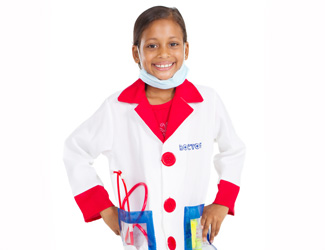A Team of Specialists
Your child’s team includes pediatric oncologists, bone marrow transplant specialists, pediatric surgeons, radiation oncologists, specialized nurses, and nuclear medicine specialists. They work collaboratively with social workers, counselors, and other care professionals to keep you well-informed and supported through every step of your child’s treatment.
Access to the Latest Treatments
The neuroblastoma specialists who care for your child are also researchers who are seeking better treatments. Our neuroblastoma doctors collaborate with pediatric cancer experts nationally as part of neuroblastoma committees through the Children's Oncology Group, the world’s largest childhood and adolescent cancer research organization.
Safe and High-Quality Surgical Care
Most children with neuroblastoma need surgery, and your child is in good hands. Duke Children’s is one of the few hospitals in the U.S. verified as a Level I children's surgery center by the American College of Surgeons. This Level I designation recognizes our commitment to providing the safest and highest-quality surgical care to our young patients.


